| Srl | Item |
| 1 |
ID:
137235
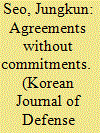

|
|
|
|
|
| Summary/Abstract |
Twenty years after the deal struck between the United States and North Korea over the nuclear crisis, the security environment on the Korean Peninsula remains unstable. When it comes to the U.S.-North Korea Agreed Framework from 1994 through 2002, previous research has paid scant attention to how the U.S. Congress responded to President Clinton’s accord with the Pyongyang regime. This article
provides a rare empirical assessment of what led America’s lawmakers to uphold or overturn the executive agreements with North Korea. The bottom-line finding is that politics hardly stops at the water’s edge, with “politics-as-usual” forces such as partisan conflicts ultimately having derailed Congressional commitments to the U.S.-DPRK accords. The results shed light on how and why domestic politics often redirects the course of international agreements, particularly in the era of
polarized politics.
|
|
|
|
|
|
|
|
|
|
|
|
|
|
|
|
| 2 |
ID:
180704
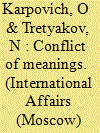

|
|
|
|
|
| Summary/Abstract |
THE RESULTS of the 2020 U.S. presidential elections represent the exact opposite of the outcome hoped for both in the United States and beyond. Rather than shed light on the future of America, its people and its policies, the elections of November 3 effectively plunged the "land of the free" into a chaos of existential uncertainty, deprived Americans of confidence in the future and inflamed the hostility of opposing political forces to the limit.
|
|
|
|
|
|
|
|
|
|
|
|
|
|
|
|
| 3 |
ID:
089321
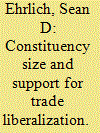

|
|
|
|
|
| Publication |
2009.
|
| Summary/Abstract |
Studies of the political economy of trade frequently rely on the assumption that the larger a policy maker's constituency, the more supportive of free-trade that policy maker will be. Large constituencies are supposed to yield concern for the national interest and provide insulation from particularistic, protectionist interests. This assumption, though, has rarely been directly tested. This article does so by leveraging the variation in district size within the U.S. Congress. This article statistically examines a dataset of roll-call votes on trade legislation from 1994 to 2004 to determine the effect of constituency size and alternative explanations for legislative preferences on foreign economic policy and finds no evidence of the effect of constituency size.
|
|
|
|
|
|
|
|
|
|
|
|
|
|
|
|
| 4 |
ID:
151254
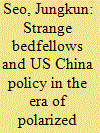

|
|
|
|
|
| Summary/Abstract |
Party polarization is the new buzzword in American politics and yet partisanship seems to play such a small role in determining congressional votes on China policy. We still do not know much about how polarized politics in Washington actually exerts influence in the making of U.S. policy toward Beijing. Paying special attention to America`s response to China from 2001 through 2012, this article seeks to analyze the sources and processes of how party polarization affects foreign policymaking. I argue that with the U.S. president adopting a hands-off approach and parties being polarized, a coalition of ideologically extreme lawmakers is likely to take cross-partisan actions over China. In essence, individual rank-and-file lawmakers tend to step forward and speak out in a party-less manner in the era of polarized America and a rising China.
|
|
|
|
|
|
|
|
|
|
|
|
|
|
|
|
| 5 |
ID:
150332


|
|
|
|
|
| Summary/Abstract |
Iran denounced U.S. congressional action to extend sanctions against the country as a violation of the nuclear deal it negotiated with the United States and its partners.
|
|
|
|
|
|
|
|
|
|
|
|
|
|
|
|
| 6 |
ID:
143687
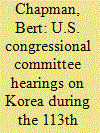

|
|
|
|
|
| Summary/Abstract |
Numerous U.S. government agencies are involved in developing and implementing
U.S. policy toward Korean Peninsula events, trends, and developments. Those
studying U.S. government policies toward this region need to pay particular
attention to the role played by U.S. Congressional committees in this policymaking.
Congressional committees are responsible for approving new legislation, revising
existing legislation, funding U.S. government programs and conducting oversight of
these programs. This work examines Congressional committee hearings and debate
during the 113th Congress (2013–2014) and reveals that multiple Congressional
committees with varying jurisdictions seek to shape U.S. government Korean
Peninsula policy and that this policymaking covers more than international relations
and international security issues.
|
|
|
|
|
|
|
|
|
|
|
|
|
|
|
|
| 7 |
ID:
185969


|
|
|
|
|
| Summary/Abstract |
Through a quantitative analysis of Taiwan–related legislation between 1979 and 2020, the article finds that the degree of Taiwan–related legislation is significantly correlated with the degree of tension in U.S.—China relations. While a deteriorating cross–Taiwan Strait relationship is clearly associated with the increasing legislative activities for the sake of Taiwan, an improving relationship from the state of fair to good cannot guarantee a decrease of such activities. A unified government and the extent of the Taiwan lobby are both helpful in passing pro–Taiwan acts but statistically insignificant. A content analysis of pro–Taiwan bills approved by the Trump administration suggests a creeping movement to “normalize” U.S–Taiwan relations with congressional activism and the less-restrained White House as a co–engine.
|
|
|
|
|
|
|
|
|
|
|
|
|
|
|
|
| 8 |
ID:
146248


|
|
|
|
|
| Summary/Abstract |
Women are drastically underrepresented in American political institutions. This has prompted speculation about the impact of electing more women on policy and the functioning of government. Examining the growing presence of women in Congress, I demonstrate that women do exhibit unique policy priorities, focusing more on the needs of various groups of women. However, the incentive structure of the American electoral system, which rewards ideological purity, means that women are not likely to bring more consensus to Washington. Indeed, women's issues are now entrenched in the partisan divide. Since the 1990s, the majority of women elected to Congress have been Democrats, who have pursued their vision of women's interests while portraying Republican policies as harmful to women. In response, Republican women have been deployed to defend their party, further reducing the potential for bipartisan cooperation.
|
|
|
|
|
|
|
|
|
|
|
|
|
|
|
|